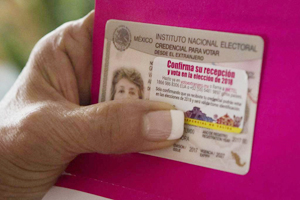by the El Reportero’s wire services
Until Sunday May 27, the National Electoral Institute (INE) has registered the sending of 140 thousand Postal Electoral Packages (PEP), of a total of 181 thousand 256, to Mexicans living abroad so that they can vote this 1st July by president, senators and, if applicable, by governors.
At the moment, four thousand packages have been returned to the country with the suffrage of the nationals. The sending and receiving of the PEPs has been carried out thanks to the UPS courier company, which has been awarded for the tenth consecutive year as one of the most ethical companies in the world (World’s Most Ethical Company) for its star practices.
This company exclusively designed guide numbers for the PEPs for the electoral process in Mexico, to ensure that all votes reach the INE-owned winery (Avenida Tláhuac #5502, Col. Granjas Estrella, CP 09880, Iztapalapa, Mexico City ) where the votes will be protected by the Mexican Army.
Teachers set up camp in Mexico City after chaotic Monday
Officials estimate 3,500 arrived in city for protest
Teachers from six states set up camp in front of the building housing the Secretariat of the Interior (Segob) in Mexico City yesterday after a chaotic day in the capital.
From 9:00am yesterday, members of the dissident CNTE union set up roadblocks at various access points to the city, while thousands marched to protest against the 2013 educational reform. Chaotic traffic conditions were reported in various parts of the city.
The teachers are demanding dialogue with the federal government but their ultimate aim is for the reform — which includes compulsory teacher evaluations — to be repealed.
At the toll booth marking the entry point to the Mexico City-Cuernavaca highway, a confrontation between protesters and police left three officers injured.
Teachers threw backpacks, sticks and stones during the clash while the police retaliated with the use of tear gas.
Yesterday’s protests affected more than 12,000 businesses and resulted in the loss of 36 million pesos (US $1.76 million) in revenue, the Mexico City business chamber Canacope said.
The capital’s Public Security Secretariat said that around 3,500 teachers arrived in Mexico City on 47 buses, although the CNTE had anticipated that as many as 12,000 teachers would arrive.
Teachers from Oaxaca, Chiapas, Guerrero, Michoacán, México state and Mexico City arrived at the Segob building at around 4 p.m.
One CNTE member from Guerrero told the newspaper El Universal that in addition to anger at the government over the educational reforms, Mexicans are fed up generally with the current situation in the country.
“That hartazgo [feeling of being fed up] is going to be noticed when it’s time to elect a president,” Salvador López said.
Among the teachers’ demands is the reinstatement of almost 600 teachers who were laid off when they refused to write evaluation tests.
“Carry on teachers, to victory, we will only get ahead with the triumph of our president Andrés Manuel López Obrador…” one protest participant said.
Protests continued today in front of the Mexican Stock Exchange building, leading authorities to bolster security at the site.
In addition to the Mexico City protests, CNTE teachers have occupied public locations in Oaxaca and blocked access to that city’s airport and central bus station.
A week-long strike in Oaxaca spread to Guerrero, Michoacán and Chiapas and teachers have vowed that it will continue until the government agrees to restart negotiations.
The federal Secretariat of Public Education (SEP) warned yesterday that it would dock the pay of teachers who missed classes but the protesters have remained defiant and CNTE members have previously shown that they are prepared to be patient.
A 2016 teachers camp set up around La Ciudadela Park in downtown Mexico City remained in place for three months.
Source: El Universal (sp), El Financiero (sp)



